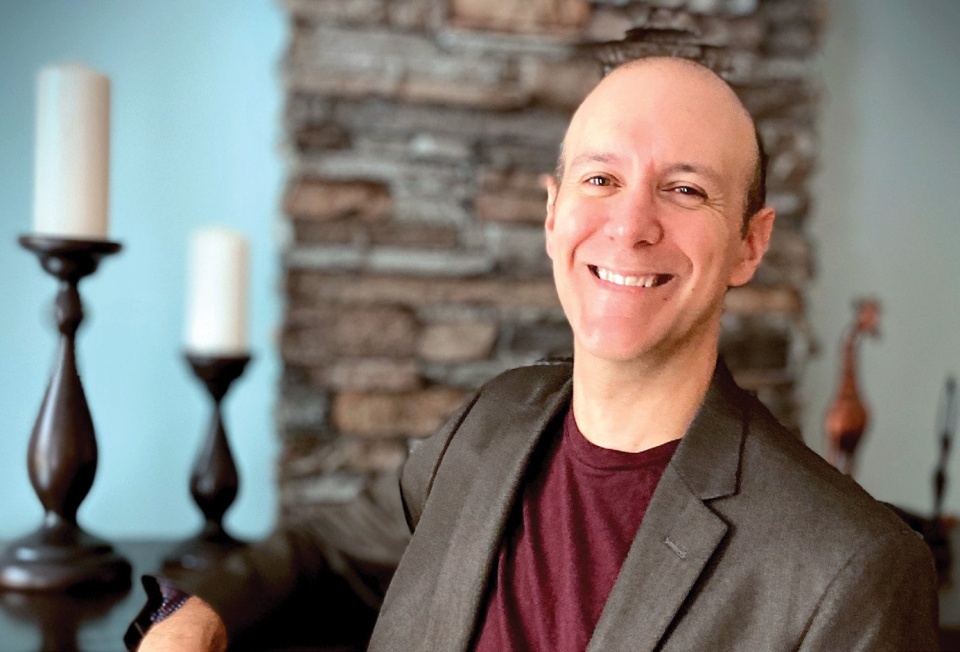Columbia College | Columbia University in the City of New York
Ruben Gonzalez

LIMARYS CARABALLO
The enthusiasm is not surprising coming from Gonzalez, who says that chemistry is his “heart and brain.” He teaches general and honors-level chemistry to first-years, but his primary focus is biophysical chemistry and the study of biomolecular structure and function; as the founder and principal investigator of The Gonzalez Laboratory, he works with undergraduate, graduate and postdoctoral research scientists from different disciplines — chemists, biologists, physicists and computer scientists — conducting biomedical research into the molecular mechanisms of gene expression, antibiotic activity and resistance, and cancer. They are currently developing projects related to coronavirus and COVID-19.
“The lab has a life of its own,” Gonzalez says. “In pre-pandemic times, there was a social component to our lab work — researchers would analyze data or work on manuscripts together, or sometimes just hang out discussing the latest results over coffee. That’s gone. Now we work in shifts, and you can only be there if you’re actively working on an experiment. Masks, gloves and eye protection the whole time. We have to be really efficient and safe.”
Gonzalez fell in love with science as a teenager in Miami, after a particularly great high school teacher introduced him to chemistry. “She taught chemistry through the eyes of a biologist,” Gonzalez says. “It was really impactful. It’s informed all the science I’ve done since then.”
He caught the research bug at Florida International University, and put off his graduation so he could spend another year working in a lab. His mentor there encouraged him to go to graduate school, and he got his Ph.D. in biophysical chemistry from UC Berkeley in 2000.
While doing his post-doc at Stanford, Gonzalez got involved in a new area of study that used advanced microscopes to look at single molecules. “I had access to these wonderful instruments that at the time existed in only five or six labs in the world,” he says. Gonzalez became one of a small number of people who could build and use these microscopes; that ability is what brought him to Columbia. “My future colleagues appreciated that I was doing this cutting-edge, molecular-level biochemistry that belonged in a chemistry department,” Gonzalez says. He started as an assistant professor and launched the Gonzalez Lab at Columbia in 2006.
In addition to his research, Gonzalez takes his role as an educator very seriously. “I had such fantastic mentors, people who had an incredible influence on my education and my research,” he says. “I was given the room to grow and learn, and I was always pointed in the right direction. I strive to do the same for my own students.”
Students need opportunities as well as mentorship, and increasing the diversity of STEM is also important to Gonzalez. As a first-generation Cuban-American who grew in an immigrant household and community, he says he struggled with issues he is now trying to address, such as an overreliance on standardized test scores for admission to academic programs and advanced courses. “I didn’t do as well as I thought I needed to on my GRE, and I figured I was sunk,” he admits. Nonetheless, some of the admissions committees saw past his test score. “So now I feel like it’s my responsibility to point out that the GRE is not the only metric, that we shouldn’t exclude students like me. All of my work is grounded in an awareness of systematic ways we take exclusionary positions — as a faculty, as a department, as an institution — and what we can do to address that.
“George Floyd’s murder and everything that’s happened since then has just amplified that,” he continues. “I really do feel like we have a moment right now, and it feels different this time. ere’s an opportunity to do something transformative. For years it’s felt like we’ve been chipping away at one little thing at a time. Now I feel like we can roll in the trucks and do something significant.”
Gonzalez lives in Riverdale with his wife and two children; he enjoys cycling, running, and camping with his family. He also likes to cook, and grows his own vegetables in their small backyard. He especially loves cooking Cuban food, he says. “I’m true to my roots!”
Issue Contents
Published three times a year by Columbia College for alumni, students, faculty, parents and friends.
Columbia Alumni Center
622 W. 113th St., MC 4530, 6th Fl.
New York, NY 10025
212-851-7852
cct@columbia.edu
Columbia Alumni Center
622 W. 113th St., MC 4530, 4th Fl.
New York, NY 10025
212-851-7488
ccalumni@columbia.edu

